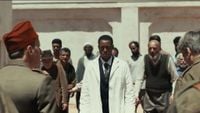Jean-Claude Barny, renowned for his previous works like "Nèg Maron" and "Le Gang des Antillais," has returned to the director's chair with a compelling biopic titled "Fanon," centered around the life of Frantz Fanon, a prominent psychiatrist and revolutionary from Martinique. The film stars Alexandre Bouyer in the titular role, supported by a talented cast including Déborah François, Stanislas Merhar, Arthur Dupont, Mehdi Senoussi, Olivier Gourmet, Salem Kali, and Salomé Partouche.
The narrative begins in 1953, when Frantz Fanon is appointed head of the psychiatric department at the Blida hospital in Algeria. His innovative treatment methods starkly contrast with the brutal practices of his colleagues, set against the backdrop of the Algerian War. The film paints a portrait of a man fiercely battling for humanity, providing a nuanced exploration of Fanon's life and his significant contributions to anti-colonial thought.
Fanon was not just a psychiatrist; he was a major figure in the decolonization movements, leaving a lasting impact on the fight against racism and systemic injustices. His journey began at the Blida psychiatric hospital, where he introduced humanistic and social approaches to patient care, breaking away from the harsh treatments that were prevalent at the time. However, the realities of the Algerian War, including the traumatic experiences of his patients and the torture inflicted by the French army, led him to a radical awakening.
In a pivotal turn, Fanon joined the Front de Libération Nationale (FLN) and abandoned his position to become a diplomat for the Provisional Government of the Algerian Republic (GPRA). His commitment to the cause was reflected in his writings, including "L’An V de la révolution algérienne" (1959) and "Les Damnés de la Terre" (1961), the latter being prefaced by Jean-Paul Sartre. These works delve into the psychological effects of colonialism and advocate for the uprising of oppressed peoples.
Fanon's life was tragically cut short when he succumbed to leukemia in 1961 at the age of 36, just a year before Algeria gained independence. The film poignantly captures his sentiments, as he expressed, "I believe I will never see independence," a testament to his dedication to the cause even in the face of personal adversity.
Why make a film about Fanon today? Barny reflects on his own journey of discovery, stating, "I was quickly frustrated by the gap between the narratives offered to me and the reality I lived. I lacked tools to understand the world." He first encountered Fanon's work at the age of 15, which profoundly influenced his understanding of identity and dignity. Barny grew up in Argenteuil, where he felt his Antillean identity was often overlooked amidst the popular narratives of his peers.
As he immersed himself in militant literature, discovering Fanon's "Peau noire, masques blancs," Barny experienced an epiphany: "This reading made me realize that I could not build my dignity with what was offered to me at the time." The decision to create a film about Fanon arose from a sense of urgency, as he observed the repetition of historical patterns in contemporary society. He stated, "I felt history repeating itself, and I saw my Guadeloupean story mirrored in the experiences of North Africans in France."
Filming took place primarily in Tunisia, with Barny emphasizing the importance of setting the film in a location that reflected the harsh realities of colonialism. He aimed to depict the complex relationships between the French and their former colonies, hoping to provide a pedagogical perspective on the historical context.
"Fanon" is not just a retelling of a historical figure's life; it is an exploration of the intersections between personal and political struggles. The film highlights Fanon's compassionate approach to mental health, as he introduced daily outings and social activities for his patients, fostering hope and community. His confrontation with the brutal realities of the French army's actions further deepened his commitment to the FLN and the fight for independence.
Alexandre Bouyer's portrayal of Frantz Fanon has been met with critical acclaim, showcasing the character's determination, calmness, and pragmatism. Bouyer shared his initial fears about taking on such a significant role but ultimately embraced the challenge. He immersed himself in Fanon's writings and worked with various professionals to embody the psychiatrist authentically. Bouyer remarked, "I had to create a Fanon who was determined and pragmatic, drawing from his immense resolve and continuous self-reflection."
The film also delves into the complexities of colonialism and its psychological impact on both the colonized and the colonizer. Barny and co-screenwriter Philippe Bernard aimed to present a balanced view of Fanon's life, including the moral dilemmas faced by characters like Sergeant Rolland, portrayed by Stanislas Merhar. This character serves as a representation of the broader psychological trauma inflicted by war, complicating the narrative of good versus evil.
Despite the challenges of production, including securing funding and navigating the intricacies of Fanon's legacy, Barny's dedication to the project has culminated in a film that honors its subject. He expressed a desire to create a cinematic experience that not only tells Fanon's story but also inspires audiences to engage with the themes of justice and humanity that he championed.
With its official release on April 2, 2025, "Fanon" invites viewers to reflect on the ongoing struggles against colonialism and racism, making it a timely addition to contemporary cinema. Barny's work stands as a testament to Fanon's enduring legacy, encouraging a new generation to explore the complexities of identity, justice, and the fight for liberation.







